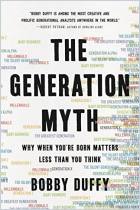Sociologists agree that the era people in which grow up differentiates them from other generations. However, they disagree about where inter-generational lines emerge. While labels like Baby Boomer help define large social shifts, believing in a gaping generational chasm may be misguided. Joe Pinsker, writing for The Atlantic, examines the perils of segregating people into what experts increasingly agree are arbitrary categories.
Certain sociologists regard generational labels as arbitrary.
In 2021, sociologist Philip Cohen and his colleagues wrote an open letter to the Pew Research Center asking the think tank to stop labeling generations – for example, as Gen Z or Baby Boomers – in its reports. They told Pew these labels are arbitrary and unproductive.
Kim Parker, head of social-trend studies for Pew, acknowledges that generational labels can be limiting, but contends they usefully convey overall demographic shifts. Parker and Cohen agree that the era a person grows up in is formative.
Grouping people into generational cohorts can illustrate meaningful differences among them. However, such labels flatten nuance and offer an impression of group cohesion that may not exist.
Generational labels don’t cover consistent time spans.
Baby Boomers describes...



















Comment on this summary or Start Discussion